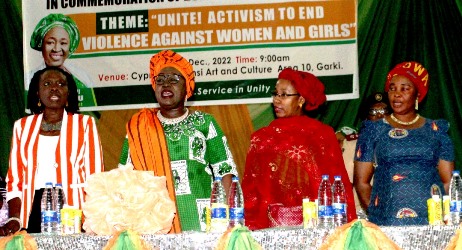By Justina Auta
The National Council of Women Societies (NCWS) and the National Human Rights Commission (NHRC) says there is need to extend the humanitarian protection intervention given to women and girls in the North East to all parts of the federation.
They made the call during the National Women Conference in commemoration of the 2022 16 days of Activism to end Gender Based Violence organised by the NCWS in Abuja.
Mr Tony Ojukwu, Executive Secretary, National Human Rights Commission (NHRC), said that as at August 2022, over 1.4 million complaints were received by the Commission’s offices throughout the country across 14 thematic areas of focus.
Ojukwu, represented by Ms Rosemary Igboyi, Assistant Director, NHRC, said out of which 248,960 were complaints on women, children and other gender issues stood at 125,500.
“There is need to extend the scope of humanitarian protection intervention beyond the North East to women and girls in other parts of the Country,” he said.
He said that the commission had established an automated call center with a toll free line, launched on UNSUB Platform, developed a manual on Integrating Female Genital Mutilation (FGM) amongst others to halt GBV.
Lami Lau, National President, NCWS, said the council since its inception, had been working towards women’s empowerment, protection of rights and ending all forms of violence against women and girls.
“As the voice of Nigerian women and the umbrella body of all women’s groups recognised by the government, we advocate for an improve welfare, progress and living standard of women and families in Nigeria.
“We work hard to increase women’s access to leadership and decision making, in other to ensure that women contribute to community development and National growth,” she said.
She decried the increasing cases of GBV across the nation which she attributed to COVID-19, flooding, insecurity, amongst others.
The NCWS boss, therefore urged the public to support and end violence and other harmful practices agaiy women and girls, especially those in IDP camps.
“The IDP camps have increased the vulnerability of women, girls and children to violence. We can go on and on,” she said.
Nasir Isa-Kwarra, Chairman, National Population Commission (NPC) said through the full implementation of the revised National Policy on Population and Sustainable Development (NPP), they would sustain advocacies against GBV.
Isa-Kwarra, represented by Dr Kehinde Seun-Addie, NPC, said beyond the activism, the Revised NPP, target to reduce GBV and harmful practices from current 46 per cent to 20 per cent in 2025 and to zero by 2030.
“Data is critical for tracking and reporting on incidences of GBV.
“Therefore, the conduct of the 2023 Population and Housing Census is imperative to provide quality, reliable, timely, well-disaggregated and geo-referenced data in this regard.
“We need your support in the conduct of the next census,” he said.
Mrs Saudatu Mahdi, Secretary General, Women’s Rights Advancement and Protection Alternative, represented by Mr Precious Anslem, State Project Officer, said the conference would provide a platform for all women to unite against GBV and other harmful practices against women and girls.
Other highlights included the conferment of awards to Mrs Shirley Okwudinma, Mrs Halima Kyari-Joda, Mairo Al-Makura and Mrs Ngozi Olejeme for their contribution and support to Nigerian women.


